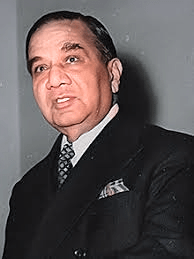Soon after the adoption of the 1956 Constitution, Huseyn Shaheed Suhrawardy replaced Chaudhry Muhammad Ali as Prime Minister on September 12, 1956. Suhrawardy had managed to secure the office for himself by forging an alliance with the Republican Party.
The controversy over One Unit and the appropriate electoral system for Pakistan, whether joint or separate, revived as soon as Suhrawardy became Prime Minster. In West Pakistan, there was strong opposition to the joint electorate by the Muslim League and the religious parties. Suhrawardy and his party in East Pakistan supported the joint electorate. These differences over One Unit and the appropriate electorate caused problems for his government.
Not a man to let setbacks destroy his morale, Suhrawardy thought his political fortunes might change if he scored some success on the economic front during his tenure. Suhrawardy tried to remove the economic disparity between the Eastern and Western wings of the country but to no avail. He also tried unsuccessfully to alleviate the food shortage in the country.
By early 1957, the movement for the dismemberment of the One Unit had started. Suhrawardy was at the mercy of central bureaucracy fighting to save the One Unit. Big business groups in Karachi were lobbying against Suhrawardy’s decision to distribute the better part of the $10 million I. C. A. aid to East Pakistan and to set up a national shipping corporation. Supported by these lobbyists, President Mirza demanded the Prime Minister’s resignation. Suhrawardy requested to seek a vote of confidence in the National Assembly, but this request was turned down. Suhrawardy resigned under threat of dismissal on October 10, 1957.
This article was last updated on Sunday, June 01, 2003






